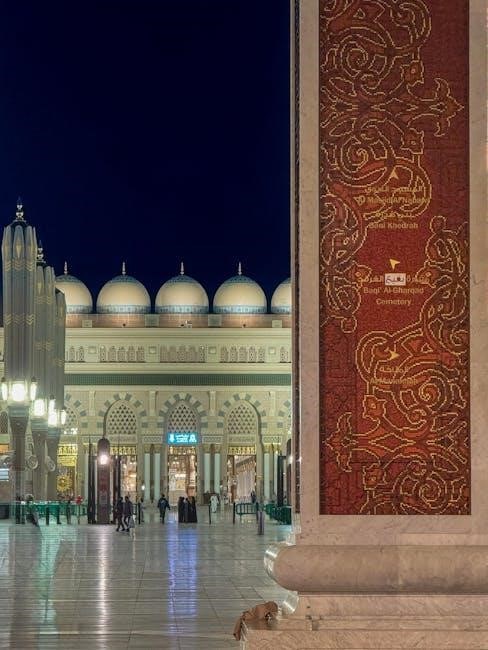Night by Elie Wiesel is a haunting memoir of the Holocaust, exploring themes of hope, faith, and humanity․ Its study guide provides detailed questions and analysis, helping readers grasp the historical context and emotional depth of Wiesel’s journey․ The book remains a powerful educational tool, fostering understanding of one of history’s darkest periods․
Background and Publication of “Night”
Night, written by Elie Wiesel, is a memoir recounting his harrowing experiences during the Holocaust․ First published in 1960, the book was originally written in Yiddish under the title Un di Velt Hot Geshvign (And the World Remained Silent)․ It was later translated into French and English, gaining global recognition․ The memoir is part of a trilogy, with Dawn and Day completing the series․ Wiesel’s vivid depiction of life in Auschwitz and Buchenwald concentration camps has made Night a cornerstone of Holocaust literature; Its raw, emotional narrative explores themes of faith, hope, and humanity․ The book has sold over 10 million copies worldwide and remains a vital resource for understanding the Holocaust’s atrocities․ A study guide accompanies the text, offering questions and analysis to deepen readers’ comprehension of its historical and emotional significance․
Night by Elie Wiesel delves into profound themes of faith, hope, and humanity amidst the Holocaust’s horrors․ The memoir explores the loss of faith as Elie witnesses unimaginable suffering, questioning God’s existence․ Hope and despair are intertwined, as characters cling to survival despite overwhelming odds․ The destruction of humanity is vividly portrayed through the moral decay and brutality of the concentration camps․ Wiesel’s narrative also highlights the father-son bond, as Elie and his father struggle to survive together․ These themes create a powerful exploration of human resilience, moral dilemmas, and the psychological toll of genocide․ The book serves as a poignant reminder of the Holocaust’s impact and the importance of never forgetting its lessons․ Its themes resonate deeply, making it a critical resource for historical and emotional understanding․

Historical Context of the Holocaust
The Holocaust occurred during WWII, as Nazi Germany systematically persecuted and murdered six million Jews․ Night depicts the invasion of Sighet, the establishment of ghettos, and the brutal deportation of Jews to concentration camps like Auschwitz, where Elie Wiesel and his family were sent․ This historical backdrop underscores the horrors of genocide and the eradication of Jewish communities, providing context for Wiesel’s personal and emotional journey․
The Setting: Sighet, Transylvania in 1941
Sighet, a small town in Transylvania, served as the peaceful backdrop of Elie Wiesel’s childhood before the Holocaust․ In 1941, the town was invaded by German armies, leading to the enforcement of anti-Semitic laws that gradually stripped Jews of their rights․ The community, initially unaware of the looming danger, faced growing tensions as foreign Jews were deported․ Moshe the Beadle, a character central to Elie’s early understanding of the Holocaust, returned after deportation, warning of the atrocities but being met with disbelief․ This setting highlights the transition from a serene, traditional Jewish life to the harsh realities of Nazi occupation, setting the stage for Elie’s harrowing journey․
The Deportation of Jews to Concentration Camps
The deportation of Jews from Sighet, Transylvania, marked the beginning of a horrific chapter in Elie Wiesel’s life․ In 1944, German forces invaded the town, forcing Jewish families, including Elie’s, into ghettos before transporting them to Auschwitz․ The journey in packed, unsanitary cattle cars was brutal, with little food or water․ Upon arrival, families were separated, and Elie was forced to lie about his age to avoid immediate death․ This traumatic event shattered the community, leaving survivors to endure unimaginable suffering in concentration camps․ The deportation symbolized the systematic destruction of Jewish life during the Holocaust, forever altering Elie’s perspective on humanity and faith․

Key Characters in the Book
Eliezer (Elie) is the narrator and protagonist, detailing his Holocaust experiences․ His father, a Disciple of the Rebbe, plays a central role in Elie’s journey, while Moishe the Beadle serves as a mentor, influencing Elie’s early spiritual growth․
Eliezer (Elie Wiesel) as the Narrator and Protagonist
Eliezer (Elie), the narrator and protagonist of Night, is a young boy living in Sighet, Transylvania, in 1941․ At just thirteen years old, he is deeply religious and studies Jewish mysticism․ His world is shattered when he and his family are deported to Auschwitz, where he witnesses unimaginable horrors․ Through his first-person narrative, Elie shares his emotional and spiritual struggles, including his loss of faith in God․ His relationship with his father is central to the story, as he strives to protect him while grappling with his own survival instincts․ Elie’s voice is raw and poignant, offering a personal and wrenching account of the Holocaust’s atrocities․ His journey reflects the broader human experience of hope, despair, and resilience in the face of unimaginable suffering․
Elie’s Father and the Father-Son Relationship
Elie’s father is a central figure in Night, embodying strength and responsibility․ Initially, he is portrayed as a community leader in Sighet, detached from Elie’s spiritual pursuits․ Their relationship evolves dramatically during the Holocaust, as Elie becomes his father’s caregiver in the concentration camps․ The reversal of roles highlights the bond’s depth and the moral dilemmas they face․ Despite the harsh conditions, Elie struggles to balance his love for his father with the instinct to survive․ Their relationship underscores themes of sacrifice, loyalty, and the disintegration of humanity under extreme oppression, making it a poignant focal point of the memoir․ Elie’s father ultimately dies in Buchenwald, leaving Elie with profound grief and a lasting sense of loss․
Moishe the Beadle: His Role and Significance
Moishe the Beadle is a pivotal character in Night, serving as Elie’s spiritual mentor․ He teaches Elie about Jewish mysticism and the Kabbalah, fostering Elie’s deep curiosity about faith․ Moishe’s significance grows when he returns to Sighet after being deported, warning the community about the horrors of concentration camps․ His eyewitness account of Nazi atrocities, however, is met with disbelief, highlighting the community’s naivety․ Moishe’s story acts as a catalyst for the narrative, foreshadowing the events that unfold․ His role underscores the theme of ignored warnings and the devastating consequences of disbelief, making him a crucial figure in Elie’s journey and the broader Holocaust narrative․

Major Themes Explored in “Night”
Night explores themes of faith, hope, and humanity’s destruction․ Elie’s spiritual struggles and the Holocaust’s horrors highlight the loss of innocence, moral decay, and survival’s cost․
The Loss of Faith and Spiritual Struggles
Elie Wiesel’s Night profoundly explores his spiritual journey during the Holocaust, as he grapples with the existence of God amidst unimaginable suffering․ The novel details how Elie, once deeply religious, begins to question his faith when faced with the brutalities of concentration camps․ The hanging of a young boy in Auschwitz serves as a pivotal moment, where Elie feels a deep sense of abandonment by God․ His internal conflict intensifies as he witnesses the moral decay and cruelty around him, leading to a crisis of belief․ The loss of faith is not just personal but symbolic of the broader theological questions raised by the Holocaust․ Elie’s spiritual struggles resonate with readers, challenging them to reflect on the coexistence of evil and divine silence․
The Theme of Hope and Despair in the Holocaust
In Night, Elie Wiesel vividly portrays the oscillation between hope and despair among Holocaust victims․ Despite the unimaginable horrors, many held onto hope as a survival mechanism, believing in a better future or reunion with loved ones․ Elie’s father, for instance, maintains a fragile optimism even in the face of death․ However, the harsh realities of the camps often crush these hopes, leading to overwhelming despair․ The duality of these emotions is central to the narrative, reflecting the psychological toll of the Holocaust․ Wiesel’s depiction of this delicate balance underscores the resilience of the human spirit while confronting the depths of human suffering․ This interplay of hope and despair remains a poignant reminder of the Holocaust’s emotional impact․
The Destruction of Humanity and Moral Decay
In Night, Elie Wiesel illustrates the profound erosion of humanity and moral values during the Holocaust․ The extreme conditions of the concentration camps led to a breakdown of ethical behavior, as survival often required individuals to abandon their moral principles․ Prisoners frequently turned against one another, fighting for scraps of food or avoiding the weak to increase their own chances of survival․ The SS guards, embodying absolute cruelty, further exemplified this moral decay by dehumanizing and brutalizing their victims․ Even among prisoners, the loss of compassion and empathy became rampant, as seen when a son abandons his father or prisoners remain indifferent to the suffering of others․ This destruction of humanity highlights the devastating psychological and ethical consequences of the Holocaust, leaving deep scars on both individuals and society․ The novel serves as a stark reminder of the dangers of unchecked hatred and the collapse of moral frameworks in extreme circumstances․

Symbolism in the Novel
Night and darkness symbolize the spiritual emptiness and despair experienced during the Holocaust, while fire represents the destruction of innocence and the horrors of the concentration camps․
The Symbolism of Night and Darkness
Night and darkness are central symbols in Night, representing the spiritual emptiness and despair experienced by Eliezer during the Holocaust․ The recurring imagery of night symbolizes the loss of faith and hope, as well as the moral darkness of humanity․ Wiesel uses darkness to convey the absence of God and the emotional void left by unimaginable suffering․ The night also symbolizes the unknown, as characters are often plunged into terrifying situations without guidance or relief․ Additionally, the darkness mirrors the internal struggles of characters, such as Eliezer’s questioning of his faith and identity․ This symbolism reinforces the book’s themes of despair, moral decay, and the psychological toll of the Holocaust on individuals․ The study guide questions often highlight these interpretations, emphasizing the profound significance of night and darkness in the narrative․
The Significance of Fire and Burning
Fire and burning in Night symbolize destruction, both physical and emotional․ The crematoriums at Auschwitz, where Jewish prisoners were burned, represent the ultimate horror of the Holocaust․ Fire also symbolizes the loss of innocence and faith, as Eliezer witnesses the burning of children and the breakdown of moral values․ The imagery of flames reflects the chaos and barbarity of the concentration camps, where human dignity was systematically destroyed․ Study guide questions often explore how fire serves as a visual reminder of the Holocaust’s atrocities, reinforcing themes of despair, moral decay, and the dehumanization of victims․ This symbolism underscores the irreversible impact of such events on individuals and humanity․

Study Guide Questions and Answers
Night by Elie Wiesel study guides offer detailed questions about characters, themes, and historical context․ They explore Elie’s emotional journey, his relationship with his father, and the significance of Moishe the Beadle․ Themes like faith, hope, and moral decay are analyzed, helping readers understand the Holocaust’s impact․ These guides also examine symbolic elements and provide insights into Wiesel’s writing style, making them essential for deeper comprehension of the memoir․
General Questions About the Plot and Characters
Elie Wiesel’s Night presents a harrowing account of the Holocaust through the eyes of a young narrator․ The story begins in 1941 in Sighet, Transylvania, where 13-year-old Eliezer lives with his family․ Questions about the plot often focus on key events, such as the deportation of Jews to concentration camps, the separation of families, and the horrific conditions in Auschwitz and Buna․ Characters like Moishe the Beadle, who warns the community about the Nazi threat, and Elie’s father, who struggles to protect his son, are central to the narrative․ Readers are also prompted to analyze Elie’s emotional transformation and his relationship with his father, as well as the moral dilemmas faced by characters in extreme circumstances․ These questions encourage a deeper understanding of the Holocaust’s impact on individuals and humanity as a whole․
Chapter-Specific Questions and Analysis
Chapter-specific questions in Night by Elie Wiesel delve into pivotal moments, such as Elie’s actions to help his father on the train and the disturbing scene of a father-son conflict․ These questions prompt readers to analyze the psychological and emotional toll of the Holocaust․ For instance, in Chapter 7, Elie witnesses a heartbreaking interaction between a father and son, highlighting the moral decay and desperation within the camps․ Chapter 8 explores the reversal of roles between Elie and his father, showcasing the brutal realities of survival․ Such questions encourage readers to reflect on the characters’ struggles, the destruction of humanity, and the enduring impact of these events․

Elie Wiesel’s Writing Style
Elie Wiesel’s writing in Night is marked by a haunting, first-person narrative that vividly captures the horrors of the Holocaust․ His descriptive language conveys the emotional and psychological toll of the events, making the atrocities feel deeply personal and real to readers․
The Use of First-Person Narrative
Elie Wiesel’s use of a first-person narrative in Night creates a deeply intimate and immediate account of his Holocaust experiences․ By narrating through the voice of Eliezer, Wiesel crafts a personal and emotional journey, allowing readers to witness the atrocities through his eyes․ The “I” perspective heightens the emotional impact, making the horrors feel vividly real․ This narrative choice also emphasizes the subjective nature of trauma, as Eliezer’s perceptions and feelings guide the story․ The first-person voice underscores the authenticity of the account, drawing readers into the stark realities of the Holocaust․ This style enables a profound connection with the protagonist’s internal struggles, making the book a powerful and unforgettable read․
Descriptive Language and Its Impact
Elie Wiesel’s masterful use of descriptive language in Night immerses readers in the stark horrors of the Holocaust․ Vivid imagery, such as the “darkness” and “flames” of the crematoria, paints an indelible picture of the atrocities․ Wiesel’s descriptions of settings, like the overcrowded train cars and the bleak concentration camps, evoke a sense of claustrophobia and despair․ His portrayal of characters’ physical and emotional states, like his father’s frailty and the prisoners’ hollow eyes, adds depth to the narrative․ The contrast between the beauty of his childhood in Sighet and the brutality of the camps underscores the moral decay․ This descriptive richness forces readers to confront the unimaginable, making the Holocaust’s atrocities feel painfully real and unforgettable․ The language not only informs but also evokes a visceral emotional response, ensuring the story’s lasting impact․

The Holocaust’s Emotional and Psychological Impact
Night reveals the profound emotional and psychological trauma endured during the Holocaust, as Elie Wiesel recounts loss, despair, and the erosion of faith․ The atrocities left lasting scars, emphasizing humanity’s fragility and the devastating effects of hatred and oppression․
Elie’s Internal Conflict and Emotional Journey
Elie Wiesel’s memoir Night vividly portrays his internal conflict and emotional journey during the Holocaust․ As a young boy, Elie struggles with his faith in God, questioning divine justice amidst unimaginable suffering․ His relationship with his father evolves from dependence to moral responsibility, as he battles guilt and despair․ The horrors of Auschwitz and Buna force Elie to confront the darkest aspects of human nature, leading to a profound loss of innocence․ His emotional journey reflects the psychological toll of survival, as he grapples with hopelessness, anger, and the shattered remains of his spiritual identity․ This inner turmoil leaves an indelible mark on Elie’s psyche, shaping his post-Holocaust perspective․
The Psychological Toll on Other Characters
The Holocaust’s psychological toll extends beyond Elie, deeply affecting other characters in Night․ Elie’s father, once a pillar of strength, succumbs to physical and emotional exhaustion, unable to protect his son․ Moishe the Beadle, initially a symbol of faith, returns broken, his stories of atrocities leaving the community in disbelief․ The mental breakdown of a father and son pair, where the son abandons his dying father, highlights the moral decay and desperation․ Prisoners like the Polish leader, who loses hope and dies, further illustrate the overwhelming despair․ The pervasive atmosphere of terror and dehumanization erodes the characters’ will to survive, leaving lasting emotional scars․ Their struggles mirror the broader psychological impact of the Holocaust on its victims․

Questions About Moral and Ethical Dilemmas
The book raises profound moral questions, such as why Elie lied about his age and occupation to survive․ It explores the ethical choices characters face under extreme conditions, challenging readers to reflect on humanity’s resilience and the consequences of desperation․
Why Elie Lied About His Age and Occupation
Elie lied about his age and occupation to survive the harsh conditions of the concentration camps․ By misrepresenting his age, he aimed to avoid separation from his family and the dangers associated with being a minor․ Similarly, lying about his occupation was a strategy to secure less demanding labor, making him appear more valuable to the Nazis․ This act of deception, driven by fear and desperation, underscores the moral complexities and survival instincts prevalent during the Holocaust; Elie’s actions reflect the difficult ethical choices individuals faced to endure unimaginable suffering, highlighting the blurred lines between right and wrong in extreme circumstances․
The Moral Choices Faced by Characters
In Night, characters confront profound moral dilemmas, often forced to make impossible choices for survival․ Elie’s decision to lie about his age and occupation exemplifies the ethical compromises necessary to endure the Holocaust․ Similarly, the narrator witnesses a father and son relationship unravel, as survival instincts override familial bonds․ These choices highlight the moral decay and dehumanization of individuals in extreme conditions․ The book raises questions about right and wrong in the face of unimaginable suffering, challenging readers to reflect on humanity’s capacity for resilience and sacrifice․ Wiesel’s portrayal of these moral struggles underscores the emotional and psychological toll of the Holocaust on its victims․

Elie Wiesel’s Legacy and the Book’s Reception
Night is a cornerstone of Holocaust literature, earning critical acclaim and numerous awards․ It has profoundly influenced Holocaust education, leaving a lasting emotional impact on readers worldwide․
The Book’s Influence on Holocaust Education
Night has become a foundational text in Holocaust education, offering a personal and poignant account of survival․ Its raw, unflinching narrative provides students with a deeper understanding of the atrocities committed during World War II․ The book’s accessibility and emotional impact make it a vital tool for teaching empathy, historical awareness, and the importance of human rights․ By sharing his experiences, Elie Wiesel ensured that future generations would never forget the Holocaust’s horrors․ The study guide accompanying the book further enhances its educational value, encouraging critical thinking and reflection․ As a result, Night remains a cornerstone in curriculum worldwide, fostering a commitment to remembrance and prevention of future genocides․
Critical Acclaim and Awards
Night by Elie Wiesel has received widespread critical acclaim for its profound and poignant portrayal of the Holocaust․ The book has been recognized as a landmark of Holocaust literature, earning Wiesel the Nobel Peace Prize in 1986 for his efforts to combat racism and oppression․ It also won the Prix Medicis in 1960, a prestigious French literary award․ The memoir has been translated into over 30 languages and remains a New York Times bestseller․ Its inclusion in school curricula worldwide underscores its educational value․ The study guide further enhances its accessibility, making it a vital resource for understanding the Holocaust’s emotional and historical significance․ Night continues to be a must-read for anyone seeking to comprehend one of humanity’s darkest chapters․
Night by Elie Wiesel shares his harrowing Holocaust experiences, emphasizing hope and humanity amidst unimaginable suffering․ The study guide enhances understanding, making it a vital educational resource․
Final Thoughts on the Book’s Importance
Night by Elie Wiesel stands as a profound testament to the Holocaust’s horrors and the human spirit’s resilience․ Its vivid narrative and moral questions provoke deep reflection, making it essential for understanding history․ The study guide enriches comprehension, aiding readers in grasping the book’s emotional and ethical complexities․ Wiesel’s legacy ensures that future generations confront the atrocities of the past, fostering empathy and preventing repetition․ This memoir is not just a historical account but a call to action, urging humanity to value freedom, dignity, and hope․ Its influence on Holocaust education underscores its enduring relevance in a world striving for peace and justice․
Key Takeaways for Readers
Readers of Night gain profound insights into the Holocaust’s atrocities and the human condition․ The memoir underscores the struggle between faith and despair, as Eliezer grapples with his belief in God amidst unimaginable suffering․ It highlights the importance of hope, even in the darkest moments, and the moral decay that can occur in extreme conditions․ The book serves as a reminder of the dangers of indifference and hatred, urging readers to value humanity and freedom․ Through Wiesel’s vivid storytelling, readers are compelled to reflect on ethical dilemmas and the resilience of the human spirit․ The study guide enhances understanding, ensuring the lessons of history are not forgotten․

